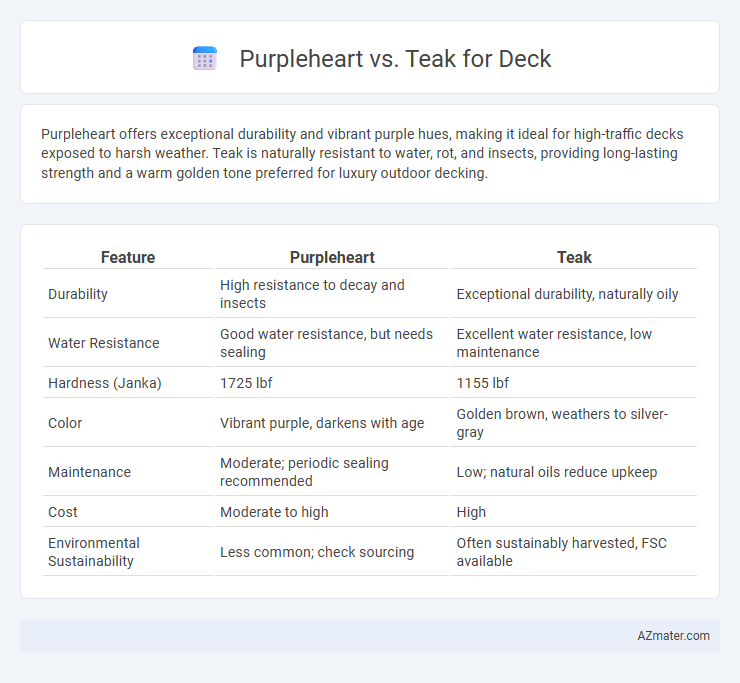Purpleheart offers exceptional durability and vibrant purple hues, making it ideal for high-traffic decks exposed to harsh weather. Teak is naturally resistant to water, rot, and insects, providing long-lasting strength and a warm golden tone preferred for luxury outdoor decking.
Table of Comparison
| Feature | Purpleheart | Teak |
|---|---|---|
| Durability | High resistance to decay and insects | Exceptional durability, naturally oily |
| Water Resistance | Good water resistance, but needs sealing | Excellent water resistance, low maintenance |
| Hardness (Janka) | 1725 lbf | 1155 lbf |
| Color | Vibrant purple, darkens with age | Golden brown, weathers to silver-gray |
| Maintenance | Moderate; periodic sealing recommended | Low; natural oils reduce upkeep |
| Cost | Moderate to high | High |
| Environmental Sustainability | Less common; check sourcing | Often sustainably harvested, FSC available |
Introduction: Overview of Purpleheart and Teak
Purpleheart is a dense, durable hardwood known for its vibrant purple hue and exceptional resistance to decay, making it ideal for outdoor decks exposed to harsh weather. Teak offers natural oils that provide outstanding moisture resistance and longevity, coupled with a warm golden-brown color that deepens over time. Both woods are prized for strength and durability, but Purpleheart's striking color and hardness contrast with Teak's renowned weatherproof qualities and smooth texture.
Appearance and Color Differences
Purpleheart features a striking violet to deep purple hue that darkens to a rich brown with age and exposure, offering a bold and exotic look for decks. Teak showcases a warm, golden-brown color with a smooth grain and natural oils that impart a lustrous, honey-toned finish, renowned for aging gracefully to a silver-gray patina. The vibrant intensity of Purpleheart contrasts significantly with the classic, earthy elegance of Teak, making color selection crucial based on desired deck aesthetics.
Durability and Weather Resistance
Purpleheart ranks exceptionally high in durability with a Janka hardness of about 2,520, offering superior resistance to wear and impact compared to teak's 1,070. Teak excels in natural weather resistance due to its high oil content and silica deposits, providing outstanding resistance to moisture, rot, and UV damage, which makes it ideal for outdoor decks exposed to harsh climates. Purpleheart also exhibits strong resistance to decay and insects but requires regular maintenance to prevent surface oxidation and color fading when exposed to prolonged sunlight and moisture.
Maintenance Requirements
Purpleheart wood demands minimal maintenance due to its natural resistance to decay, insects, and weathering, making it ideal for outdoor deck applications. Teak requires regular cleaning and periodic oiling to preserve its natural oils and prevent surface degradation, ensuring its durability and aesthetic appeal. Both woods benefit from proper sealing to enhance longevity, but Purpleheart's denser fibers reduce the frequency of upkeep compared to teak.
Cost Comparison
Purpleheart hardwood typically costs between $12 to $18 per board foot, making it a premium choice for decking due to its durability and vibrant color. Teak ranges from $30 to $45 per board foot, reflecting its high oil content, natural resistance to weather, and long-term value. While Purpleheart offers a more budget-friendly option with strong performance, Teak commands a higher upfront investment driven by its superior rot resistance and minimal maintenance requirements.
Workability and Installation
Purpleheart offers excellent workability with its moderate density and fine grain, allowing for easy cutting, shaping, and sanding during deck installation. Teak's natural oils make it somewhat more challenging to work with hand tools but provide superior resistance to moisture and decay, easing long-term maintenance after installation. Both woods require pre-drilling to prevent splitting, but Purpleheart's dimensional stability provides a smoother installation experience compared to teak's tendency to warp.
Environmental Impact and Sustainability
Purpleheart is a dense hardwood known for its durability and resistance to decay, sourced primarily from Central and South America, where sustainable harvesting practices are increasingly implemented to mitigate deforestation. Teak, native to Southeast Asia, is prized for its natural oils that enhance weather resistance, but concerns arise from illegal logging and habitat destruction despite the existence of certified plantations promoting sustainable cultivation. Choosing between Purpleheart and Teak for decking involves weighing the environmental benefits of responsibly managed forests and certifications such as FSC, which ensure reduced impact on ecosystems and support long-term forest regeneration.
Slip Resistance and Safety
Purpleheart offers exceptional slip resistance for decking due to its dense, fine grain and natural oils, making it a safer choice for wet or high-traffic areas. Teak also provides good slip resistance with its textured surface and natural oils that help prevent water absorption, reducing the risk of slipping. Both hardwoods enhance deck safety, but Purpleheart's higher density typically results in better traction and durability over time.
Longevity and Aging
Purpleheart offers exceptional longevity for decks, with natural resistance to rot, decay, and insect damage that extends its lifespan beyond 40 years when properly maintained. Teak also provides outstanding durability, characterized by its dense oil-rich grain that resists water absorption and aging, often lasting 25 to 30 years with minimal maintenance. Over time, Purpleheart ages to a deep violet-brown patina, whereas Teak gradually turns a smooth silver-gray, both evolving distinctively while maintaining structural integrity.
Conclusion: Which Wood is Best for Your Deck?
Purpleheart offers exceptional durability and vibrant color, making it ideal for decks requiring high resistance to weather and decay. Teak is prized for its natural oils, providing excellent water resistance and a classic, warm appearance that ages gracefully over time. Choose Purpleheart for strength and bold aesthetics, while Teak suits those seeking a luxurious, low-maintenance finish with proven longevity.

Infographic: Purpleheart vs Teak for Deck
 azmater.com
azmater.com